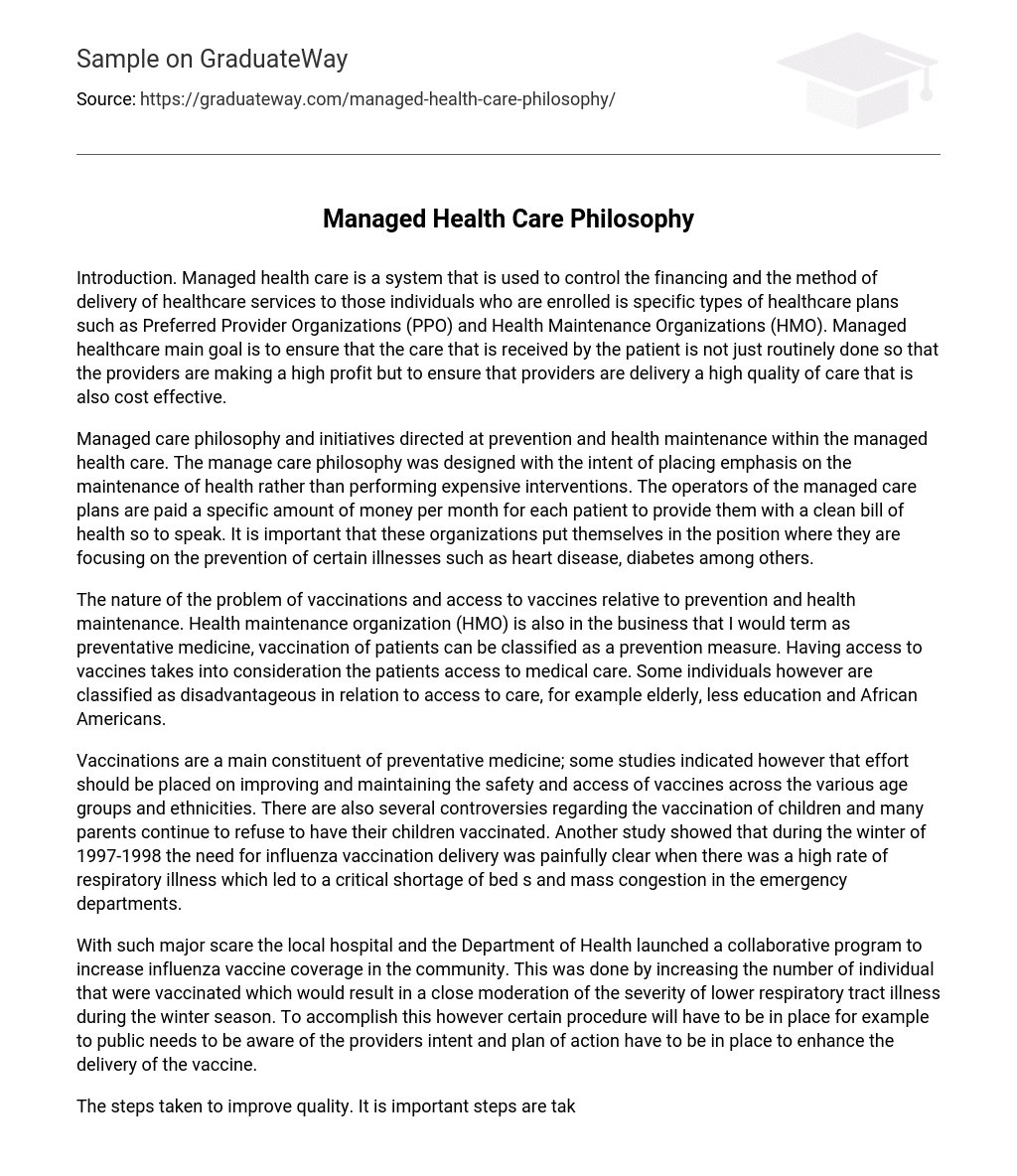Managed health care encompasses the management of funding and provision for healthcare services within specific healthcare plans, like Preferred Provider Organizations (PPO) and Health Maintenance Organizations (HMO). The primary objective is to prioritize quality and affordability in patient care rather than solely pursuing profits.
The philosophy and initiatives of managed care focus on prevention and health maintenance. The goal is to prioritize health maintenance over costly interventions. Managed care plans receive a fixed payment per patient per month with the aim of keeping them in good health. These organizations strive to prevent diseases like heart disease and diabetes.
The discussion on vaccinations and vaccine accessibility is intricately connected to disease prevention and overall well-being. Health maintenance organizations (HMOs) contribute to preventive medicine, utilizing vaccines as a means of prevention. The availability of vaccines is directly linked to patients’ access to medical care. Nevertheless, specific demographics including the elderly, individuals with limited education, and African Americans encounter obstacles when attempting to access healthcare.
Although vaccinations are crucial for preventive healthcare, some studies indicate the necessity of prioritizing vaccine safety and accessibility based on age groups and ethnicities. The topic of vaccinating children remains contentious as certain parents hold opposing views. Moreover, a study highlighted the critical requirement for influenza vaccination in the winter season of 1997-1998 due to an increase in respiratory illnesses, leading to a scarcity of hospital beds and overwhelming emergency departments.
The local hospital and the Department of Health collaborated to improve influenza vaccine coverage in response to a significant scare. Their objective was to increase the number of people getting vaccinated, thus lessening the severity of winter respiratory illnesses. To achieve this, specific procedures need implementation. The foremost priority is raising public awareness about providers’ intentions. Additionally, action plans should be formulated to ensure smooth vaccine delivery.
The objective is to enhance quality. Steps must be taken to boost immunization rates and ensure a secure delivery. It is crucial to maintain immunization records at the federal level for an extended duration. The implementation of point-of-service data entry significantly improved the quality of immunization. Additionally, an automated immunization reminder and a monthly report on the patient’s immunization status were introduced to multiple providers. Furthermore, a comparison was made between immunization rates per provider.
Various initiatives were implemented to maximize the reach of vaccination. One of these efforts focused on diminishing the number of unvaccinated individuals by providing vaccines to patients, irrespective of their financial capabilities. Enhancing the efficacy of vaccines involves considering their clinical aspects, which are evaluated through FDA-approved studies that determine whether the vaccine effectively safeguards individuals against the targeted disease.
The vaccine’s cost effectiveness should prioritize saving lives and money. Most vaccines include disease burden criteria to prevent diseases with high morbidity rates, which helps reduce the transmission of the disease from person to person. Evaluating what works and what doesn’t, I believe that prioritizing patients’ well-being is essential for physicians, as it focuses on maintaining public health.
The utilization of HMO immunization registries increased with the implementation of point-of-service data entry. An effective measure is the automated immunization reminder for patients, as well as the provider’s monthly reports. However, in cases where physicians have a conflict of interest and serve both HMO and other communities’ patients, the best treatment options and access to vaccinations may not always be provided to the patient. Therefore, my recommendations for further or continued improvements are as follows.
To promote vaccination acceptance and encourage individuals, including children, to get vaccinated, it is essential to build trust between patients and healthcare providers. Moreover, it is important to identify effective strategies and use software to improve immunization records in managed care facilities. In relation to vaccinations, it would be intriguing to examine the connection between your prior essay on Breast Cancer screening and this issue.
The research I conducted on breast cancer screening is applicable to the subject of vaccination because both involve individuals hesitating to accept care in certain circumstances. Certain people decline to vaccinate their children due to health concerns or religious beliefs. Conversely, there are individuals who desire vaccinations but cannot access them due to specific factors, especially among disadvantaged communities and diverse ethnicities.
These are two current topics of discussion in the media: the recommended change in breast cancer treatment and the recommendation for H1N1 vaccines. According to a study, intervening by vaccinating older children and families with low educational backgrounds can improve vaccination rates among high-risk individuals. It is also important for researchers to focus on the quality of asthma care for children.
References:
– Medline Plus (2004). Immunization. Retrieved on October 15, 2004, from http://www.lm.nih.gov/medlineplus/immunization.html.
– Michael F Parry, Brenda Grant, Anthony Iton, Patricia D Parry, & Diane Baranowsky. (2004). Influenza Vaccination: A Collaborative effort to improve the health of the community. Infection Control and Hospital Epidemiology, 25(11), 929-32. Retrieved November 24, 2009, from ProQuest Medical Library.
– Sangeeth K Gnanasekaran, Jonathan A Finkelstein, Paula Lozano, Harold J Farber, & et al. (2006). Influenza Vaccination among Children with Asthma in Medicaid Managed Care. Ambulatory Pediatrics, 6(1), 1-7. Retrieved November 24, 2009, from ProQuest Medical Library.





